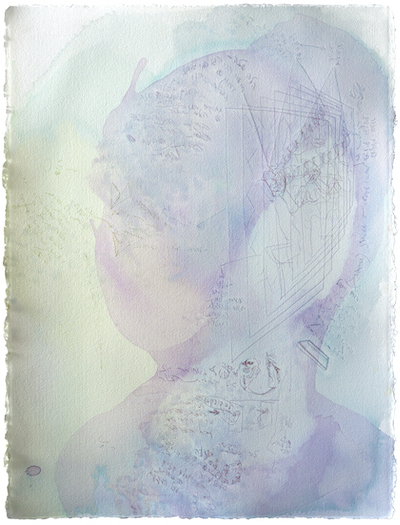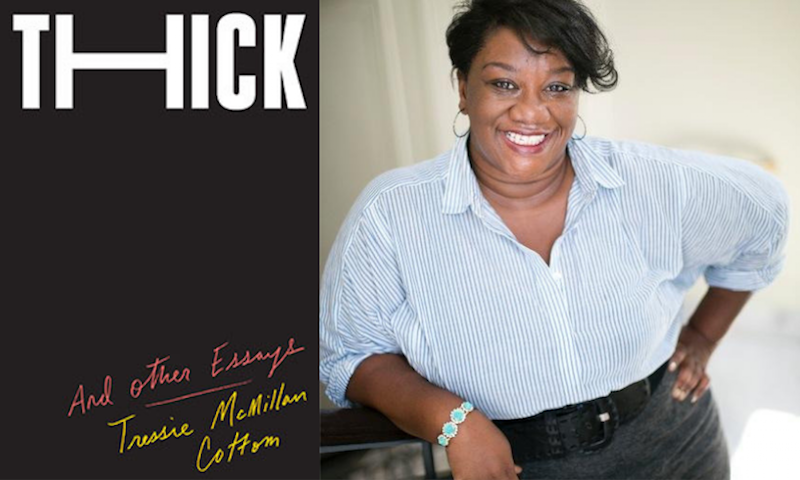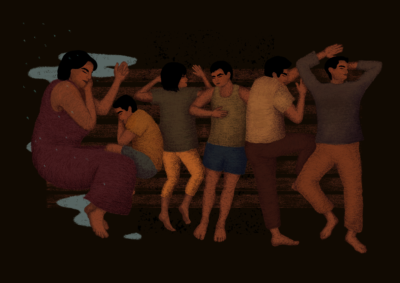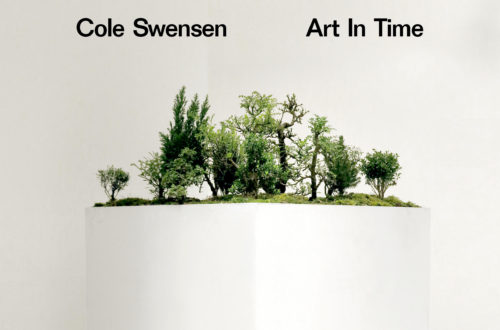
Black Is Over (Or, Special Black) by Tressie McMillan Cottom with Artwork by Merav Kamel
Above: from the Sketchbook of Merav Kamel
I’m looking for a mixed girl Asian, Jamaican
I’m looking for a mixed girl Puerto Rican, Haitian
I’m looking for a mixed girl
Cuban and White
I’m trying to get mixed up tonight like
Excuse me miss, what’s your name, where ya
from, can I come
—T-Pain, “Mix’d Girl”
“Black people are over.” That is how it was said to me once. The occasion was a meeting of professors who were working together on a student project. It was a “people of color” cabal. If pressed to do so at a glance, one might have said that everyone in the room was black. In a discussion of methods and theories and other such things that comprise a significant part of my job, one of the women—we were all women—said assuredly that we have moved on, past black and white. Hence, “black people are over.” I did not feel over and I am most certainly black. But it was said so casually because of the kind of black that I am presumed to be in rooms such as these. There have been many such rooms and I end up in more of them, more frequently, the more I inch up the class ladder. The proclamation makes a mistake of assuming that black people, like me, were only ever a problem and not a people.
But, first, just what kind of black am I?
It is actually a common question. A senior scholar of great standing in my profession once said to me, “I do not trust you. Too many white people like you.” Which, ouch. He also told me that being a dark black woman would prove a problem for me in academia. I am glad a man finally told me that, I tell you what. This was all said with great affection, by the way. I had passed a test for what kind of black I was. It is a political question—do I align myself with the interests of black people? I do. Only, the question can be more complicated depending on which black people are in question.
Do I align myself with black people across the diaspora? With black people on the political left or the political right? With black people who have a nonblack parent? With black people who prefer African American or nigga?
The easy answer is that I am basic black. The harder answer is that it’s never as easy as it sounds.
What has been offered to me or denied me in parts, at different times, are opportunities to agree that black people are over. I can never know what the people who offer me this are thinking, but it seems that the offer is conditioned on that darkness and woman-ness the great man scholar told me would be a professional problem.
This was not a problem I remember experiencing growing up. I knew that not all black people were like us. I spent time in New York with Dominicans and black Puerto Ricans who would fight if you called them black. One of my mother’s best friends was a Haitian chef named Henry George. He did wonderful, unholy things to fish. We traveled. I knew black people came from all over the world.
Once, I liked a Dominican boy named Nigel. We were play-hide-and-go-get-it-years-old. I was dark, as has been established. It had never been an issue for me before. Despite a world’s obsession with colorism, where the darker people of almost every nationality are marginalized relative to their lighter and whiter kin, I grew up in a bubble. Nigel tried to get me. I did not try very hard not to let him. In 1980s preteen culture that made us the neighborhood Brangelina for the summer. It was a simpler time.
It was simple until Nigel’s older brother caught us kissing behind the house. He was not upset about the kissing part. He was more than upset about the black American part. He told Nigel not to let their family catch him. He meant with me. Do not let his family catch him with me. I was so precious that I did not understand the admonishment until much later when my worldlier cousin explained that Dominicans do not date black-black girls. Not dark black, although that was certainly part of it. But black-black. Regular black.
The kind of black that we are is over.
In sociology, we often refer to black people who are in the United States but who are not descendants of either the enslaved or, later, of those who experienced the Great Migration as “black ethnics.” It is a complicated term because it implies that black Americans do not have an ethnicity. In layman’s terms we are usually trying to differentiate black people who are born in the United States from those who were not. There is some intuitive understanding that black ethnics have a distinct culture but that they are also captured in the anti-blackness dragnet that does not ask if you have an accent before it shoots you.
As I have argued elsewhere in this volume, whiteness has the political power to be elastic. Originating as it does not from nation or kin but from the primordial ooze of capitalism, whiteness can only be defined by state power. It requires a legal system that can formalize irrational biological expressions, making them rational. It needs a justice system that will adjudicate the arbitrary inclusion and exclusion of people across time. And, most of all, whiteness requires a police state that can use violent force to defend its sovereignty.
Blackness is necessarily static as a counterweight to whiteness.
Black ethnics have always complicated whiteness’s desire for cheap labor and ideological mascots because what is real and perceived about them challenges blackness as a fixed, homogenous biological project that supersedes culture, nation, and environment. The reality of that imagined blackness has never held.
How you experience the heterogeneity of blackness depends in large part on where you grow up. In the U.S. South, close as we were to interstate highways that truck cargo from Canada to Mexico and back, we were more likely to have Mexicans around us than we were to know Dominicans. In New York, black is as fluid as the heat waves that rise from the sidewalks in August. You can walk through five Littles in five blocks: Little Haiti, Little Jamaica, Little Nigeria, Little Trinidad, Little Ethiopia. Out west in California, Afro-Latino culture and black American culture are historically intertwined. Growing up in the South, my experience with black ethnics as a steady presence was limited to summers and vacations. That was true through college. Graduate school was something else.
For the first time in my educational career, I was attending a predominantly white school. And, also for the first time, I had reason to become intimately juxtaposed against different class hierarchies that pried apart my racial identity from my class identity. I had attended majority-minority schools for most of my primary schooling. My high school was historically and majority black during my tenure. And I had chosen to attend a historically black college for undergrad. This had never felt strange to me until my first days at Emory University.
Emory University is white. I mean, literally white. Almost the entire campus is constructed from white Georgian marble.
You could outfit a lifetime’s worth of HGTV kitchens with the rubble of Emory’s architecture. I remember walking along, my first day on campus, and thinking that this must be what it is like to be trapped alive in a mausoleum. A mausoleum of whiteness. So very white.
My cohort was also so very white. It was full of lovely people, but, save for three of the maybe thirty students I regularly engaged with on campus, they were all white. But the university knows all of the right things to do about “diversity,” a bullshit term invented by bureaucrats who stutter when they say “black.”
In the modern university, a good liberal arts school believes in equal opportunity. It welcomes diversity. It promotes that diversity in all of its marketing materials. Some go so far as to have more nonwhite students in their marketing than they do in their classes.
Such a university defines diversity broadly. It includes international students and differently abled students and sexual minorities and so forth and so on. It would likely include height if it could. What matters here is that diversity is good and to demonstrate its commitment to diversity the university sponsors a black graduate student association.
In search of survival, I signed up for the very first meeting of the Black Graduate Student Association.
The meeting was about the important things: where to get our hair done, what clubs were popping, and what side of town everyone lived on so that we could socialize. Then, the conversation turned to area soca clubs and Brazilian salons. I love soca. I love a Brazilian blowout. I was with it. And then someone in the room asked, “Where do the local black-black people go?” so that it could be avoided. I was taken aback. I identified with those local black-black people. In fact, the high density of local black-black people was a big part of why I had chosen a school located in Atlanta, Georgia. The comment went unremarked upon, taken for granted as a reasonable concern for this group. That is when I looked more closely at the room.
The black graduate student association at Emory University was black, broadly defined. And, given the university’s preference for students who could be both black and some other kind of diversity category, many of those students were black ethnics: Nigerian, Beninese, Jamaican, Cape Verdean, Dominican, Haitian.
It is a sticky thicket to discuss, but for many reasons, black ethnic students and faculty can bring cachet to a university that plain black students, like me, cannot.
Nothing about the logistics of this makes sense materially. One academic administrator once said of a California school that faculty and administration were more enthused about diversifying their faculties through international black ethnics than U.S. black professors, despite the former having more upfront hiring costs.
At elite universities especially, administrators and faculty view black ethnic students as better prepared than U.S. black students. As a Duke University professor once put it to me, “African students appreciate their educations,” which I took to mean black ethnic students presumably cause fewer problems than regular blacks.
From the students’ perspectives, U.S. universities are a part of a post-colonial game of western credentialism where those with the means in nations beset by extreme income inequality purchase a pathway into the global labor market. Just as is true of international students from China, Japan, and India who find their way to the United States, our universities are generally cherry-picking the winners of extreme social stratification in other countries through our admissions processes.
The black ethnic students in that room were no more representative of their home nations than I am of the United States. But in an oppressively white school we are all “black” in a way that should matter and that should flatten these differences, with various degrees of success.
That is because class matters, and so does culture.
Those are deeply intertwined, class and culture. Graduate school moved me up a rung or two in social class mobility. There is not much money attached to doctoral studies, but social class is about more than money. It is about attitudes and culture and tastes. And Emory certainly had attitudes, culture, and tastes that were different from those in my previous educational institutions. By moving up I had also moved into a space where blackness was more contested than I had ever before experienced. This is the moment when I was supposed to learn that black is over.
Black was so over that it was not even a serious field of study in my academic department.
The department at the time was so wholly uninterested in black people and the study of black life that for several years the graduate students taught all the undergraduate courses in race. In such spaces, you have to build buffers for your emotional and mental health. That is how I ended up at dinner one night with about seven or eight black people in academia. Most of us were graduate students. We were there to kiss the ring of a visiting professor and to talk to other black people for a little while. The visiting professor introduced me around with great fanfare. I was brilliant, a phenom, really going places. He had to say that because he had once been my professor. He was responsible for me. This kind of thing is also the way the people at the table are supposed to know how to treat you, a very big deal in an insular work world like mine.
Because I was such a big deal to an actual big deal, the black man seated to my left made a great effort at small talk. I wish he had not bothered. I hate small talk. It is small. Small is for teacups and occasionally for tiny houses.
Too much small talk is how a country is given to sociopaths who thrive on shallow chatter to distract their emotional sleight of hand. Talk should be meaningful or kept to a minimum.
We moved quickly through the basics. What do we study? How is school going? Teaching or research? Finally, the man moved on to who I was rather than what I was: “So, where are you from?” An easy question. I am from North Carolina. “No, I mean where are you from?” I am not confused, but perhaps he is, so I say it again. I am from North Carolina. He got a little frustrated, as if I were being deliberately obtuse.
Here is where anyone who does not look white or black will find me ridiculous. Such people are asked all the time where they are from.
People ask the question of persons whose physical or cultural presentation disrupts the questioner’s intuitive understanding of race.
Black people do not have blue eyes—where are you from? Asians are from China and Japan, but you are brown—where are you from? You are blond but you are speaking Spanish, which is what Mexicans speak—where are you from?
The question is not strange for its being asked, but for its being asked of me. My entire life I have had absolutely no gap between how I perceive myself and how the world perceives me. I identify as exactly what I look like I am. It is a kind of privilege in a world where conforming to somatic expectations of race, gender, and sexuality minimizes invasions of your privacy and property. But it is a complicated privilege.
The privilege got very complicated that night. Overhearing the conversation, the visiting professor intervened with a laugh. “He means what kind of special negro are you?”
I eventually unpacked it all. I was in a room where I was presented as exceptional. And, in this man’s mind, exceptional black people are not regular domestic black people, especially in a profession that promotes the idea of black ethnics as superior black people. These are the black people who are less likely to agitate for a course on race in a sociology program too unbothered to be embarrassed that they do not have one. These are the black people who bring status to the student body by being international. You can offer Jamaican food in the cafeteria during the diversity menu week without being racist. Were I as exceptional as I had been introduced to be, in this room full of people who were filtered through that institutional process, it would have been reasonable to assume that I was a kind of black who would have a better answer than “North Carolina” to “Where are you from?”
That is, it was reasonable to assume that I was not black-black.
Over the years I have had strangers try repeatedly to make me over into a different kind of black. There was the Nigerian tennis player I dated for a while. He liked very much to introduce me as “the woman getting her Ph.D.” Didn’t I have any African in my family? I certainly looked like it, he suggested. And, if I did, it would make introducing me all the better. There was the man in Massachusetts who refused to accept that I was not West African. The basis for his incredulity was the Harvard T-shirt I was wearing while filling up my tank.
These are funny stories about identity and relationships.
There is a bit of condescension in assuming that I must be something other than black American if I am also intelligent and high-achieving. But I rarely take these as insults.
People like to project the best of themselves onto others. This is especially true when the people are economically vulnerable like the tennis player and the Massachusetts gas attendant. Even when it feels dirty, it mostly comes from a place of pride. And one needs a lot of pride in their culture when they leave it for greener pastures. No matter why you leave, home is still home. And nothing is better than home.
I am much more insulted by the assumption among similarly classed people that I should jump at the chance to be a special kind of black.
At a tea party once, a light-skinned black woman fixed her sights on me over a second cup of Earl Grey. She looked like so many of this kind of woman look. She was impeccably styled. Her hair was not chemically treated. The big, frizzy curls marked her as black. The hair may have been at war with the freckles across her nose. In case the hair was not enough, she had chosen some jewelry that, when I remarked upon it, she breezily said was made by a rural woman’s collective in Uganda. She had picked it up on her last trip to “the continent.” People do not talk like that where I come from. But I have manners. I nodded like it was a perfectly sensible thing to say in response to a perfectly mundane comment.
“And you? Did you meet the hostess in Cape Verde?” No, I had not. I have never been to Cape Verde, the small creole African island. “You could say it, you know. There are dark people there like you.”
Well, thank you very much.
Cape Verde sounds lovely and I intend to never live there in my life. I told her as much. She never did accept that I was serious. Instead she seemed almost embarrassed for me, so much promise and too ignorant or self-conscious to jump at the chance to be a fake Cape Verdean.
My social status necessitated that I perform or at least desire a different kind of blackness. Often, people seem insulted that I could choose to affect some other version of myself but do not.
This desire for a new kind of black pops up in our politics, when we want Barack Obama to be black and biracial and immigrant and black ethnic.
Every so often there is a flare-up in popular culture when someone identified as black-black is actually black ethnic. Just like the university context primed these tensions in my life, the context of media and politics produces these conflicts. There is a belief floating around that there is a limited amount of media space held for “black issues,” which we often interpret as jobs held by black people. That is true to some extent. Despite our new twenty-four-hour, on-demand, issue-driven media landscape, most outlets allocate a small percentage of their resources to covering anything “black.” You can see it in the many talented writers and journalists and analysts who are quarantined in the “race desks” at major media companies.
On occasion, a voice breaks through the social-media-driven discourse. Luvvie Ajayi is a blogger who became a New York Times best-selling author, in part because of her commentary on race and gender.
Luvvie’s career is interesting for many reasons. She figured out the formula for generating real income in a new media landscape where there are more broke famous people than there are genuine celebrities. Her work mixes humor and critique and inspiration. She is younger and far less self-serious than Chimamanda Ngozi Adichie. And she has been touched by god: Oprah Winfrey has endorsed her as an “it” girl. She is, according to one journalist, a “life guru” who is like “Oprah before them.”
In 2017 Luvvie poked the social media nest when she wrote that some black activists try to profit from white guilt. It is a long, drawn-out messy affair with almost no real stakes involved. I’ll spare you the details. What is important to understand is that Luvvie had not said anything that has not been said millions of times before by other people for at least a hundred years. W.E.B. DuBois once accused Booker T. Washington of working the white guilt of wealthy patrons for his own personal gain. This is an old slam.
Except Luvvie is Nigerian American. She is black, but the questions arose online and in print, is she black-black?
The issue was another old one: who can speak legitimately about and for black people in the United States?
For the record, there is no answer. At least there is no good answer. Because the truth is, black people can rarely gatekeep the boundaries of blackness. That is why the artist formerly known as a white woman, Rachel Dolezal, drove so many black people mad. Dolezal had not only presented herself as a black woman. She had not only adopted our hairstyles, our culture, and our struggle as her own. She had done so and there was nothing that black people could do about it.
Dolezal did not need to convince black people that she was black. She only had to convince white people.
I watched another great black voice, Melissa Harris-Perry, give a whole hour to Dolezal on her MSNBC show. Harris-Perry appeared to be indulging Dolezal’s performance as legitimate. I have always been certain that this is when Harris-Perry’s show lost many of its most hardcore fans: black women. We do not take lightly that we are so vulnerable to the whims of white fancy that we cannot even keep a black woman from lifting up a white woman cosplaying us for personal gain.
Over and over again in research literature on such things, back when black people were not over, we find that the perception of scarcity exacerbates conflicts over who is legitimately black. That is why I would go most of my life having never heard “Where are you from?” until I entered the white, white hallowed halls of Emory University, where we were once told, in all earnestness, that they could not accept more than one black student per year in our department’s doctoral program. Scarcity. When Barack Obama was elected, almost every media outlet had to at least perform a nonwhite perspective. For a while, what some people have called “race whisperers” had a steady presence on TV, on mastheads, and in bylines. When Obama left office, black was over. And so was the race and culture desk at MTV News, among others. Scarcity.
When there is only room for a few blacks there is a competition for which black should prevail.
That is also what my colleagues were saying to me that day as we sat around debating the merits of a student’s research project. There is only so much attention to go around, and if the question is going to be about race or racism, then black people have had more than their fair share of attention. We had resolved the issue of the negro problem, and the negro was the problem. It was time to move beyond that “black-white dichotomy,” by which it was meant that we had exhausted all valuable social inquiry into black life.
If resources are scarce, then black is over.
The comment was not all that unique. It remains strange that it was said to me, specifically. Initially, I took it as an invitation and would forcefully refuse it: “No, I am not from anywhere special. I am just black.” Then I tried taking it as a misguided but well-meaning attempt at solidarity. As in, we are all in this anti-whiteness, anti-colonialism thing together, but I cannot say that I am black so let’s pretend that you aren’t either.
Eventually I decided that asking me to be something other than black, exchanging black for being a person of color was anything but well-meaning. Finally, for now, I have decided on being as black-black as I can be. It is my protest.
If you think that I am intelligent and ambitious and reasoned and formidable, if you think one good thing about me at all, then I insist that you reconcile that with me just being regular black-black. My mother once paid for a coach to help me lose my southern accent. I can still do it, if I think about it hard enough. You basically wake up your tongue; by nature southern tongues are lazy, like our summers. You get the tongue to stand up straight and you flatten the back of the mouth just a bit. That will take out about 60 to 70 percent of your southernness. The rest is about syntax and meter. Strangely enough, to de-southern speech is often to whiten your speech. I could do it, but I do not want to.
I will not code switch on NPR or The Daily Show with Trevor Noah or at the White House. I do not do it in front of my students or with the young people in my life.
I do not want to be unattainable for these people that I love. Doing that requires a lot of work on my ego. I have to constantly sacrifice the idea of scarcity. I know scarcity is mostly a social construction, but it is something else entirely to act like I know. No one can speak to a singular black experience, not even me. Especially not me. Rejecting that belief does not free me, but it goes a long way toward being authentic.
Black is not over. The postcolonial project of dismantling the vestiges of imperialism is about blackness, just like the U.S. Civil War was about slavery.
There is no post-black race theory or race work or racial justice or activism that can thrive by avoiding this truth. Whether at a dinner table or in grand theories, the false choice between black-black and worthy black is a trap. It poses that ending blackness was the goal of anti-racist work when the real goal has always been and should always be ending whiteness.
Copyright © 2019 by Tressie McMillan Cottom. This excerpt originally appeared in THICK: And Other Essays, published by The New Press and reprinted here with permission.





